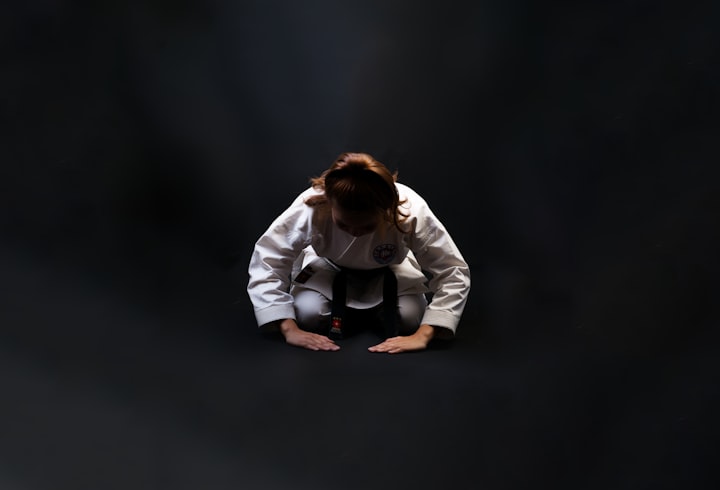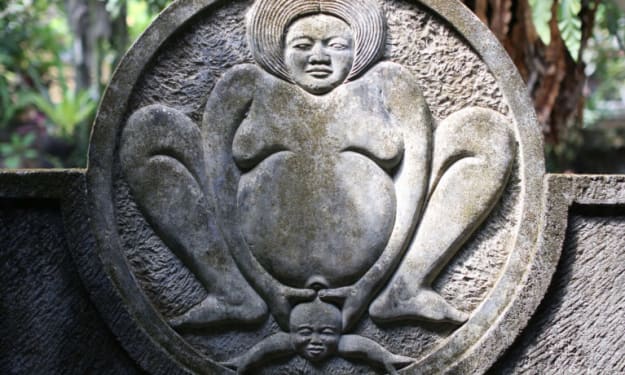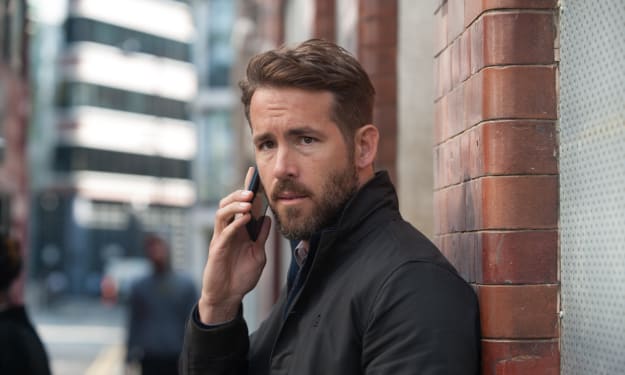The Slap
What doesn't kill you, makes you stronger.

What I remember most about the slap is how the sound, like a shot, echoed across the dojo. I wouldn't feel the soreness, the tenderness, for a second or two. I was stunned. My body froze. I gaped at my teacher, trying to register what had just happened, but he'd turned away. I'm 58 and I had never been intentionally hit across the face before. By accident, sure, in sparring, or being jostled at a concert, or on a crowded dance floor or whacked with a tree branch. Never on purpose.
My cheek started to burn, as much with the impact of his hand, as my own shame. I felt angry, humiliated and uncertain, all at the same time. The worse thing was, given the code of the martial art in which I train, I couldn't do or say anything to address what had just happened or I would embarrass my teacher and cause him to "lose face" by questioning his judgment.
I had to suck it up or or my frustrated teacher might spiral into an explosive show of anger. Worst of all, I was being sent a message that it was all my fault because I was failing to grasp the correct way to apply techniques in sparring.
I wasn't Sifu's best student, far from it, but I was just as dedicated as any other pupil and I thought I'd proven my comittment over the past few years. I was 58 and while I was in good physical shape, I couldn't do the falls and rolls without getting vertigo. I'm also very much in my head, always thinking, which can be a drawback in a physical sport that requires focus and attention and body-centered memory to learn a lot of forms. I would watch the younger students enviously as they seemed to effortlessly remember the movements.
Sifu was always telling me, "You have to remember your forms better, because there is a lot of new material you have to learn." But my body memory was slow and needed a lot of repetition. Sifu expected to show students new movements once or twice and then you grasped it. This is traditionally how martial arts, especially Chinese styles, are taught. He's very old school in that way.
*
I've trained in martial arts, on and off, since I was 12. My Dad thought it would be a good idea if my brother and I learned how to protect ourselves physically. He dragged the two of us off, protesting and complaining, to Mr. Dutcher's Korean Karate school. Our teacher had served in the US Army during the war and learned the ancient fighting art when he was stationed there. He was a huge bull of a man, with a massive chest, and legs and arms like tree trunks. He always put me in mind of classical Greek heros like Hector or Achilles. He was tough on us, and pushed us physically in class. My brother dropped out within six months after he broke his hand and my Dad lasted a year.
But I was hooked.
I loved the training and how it made me strong. I loved hearing the sharp snap of my stiff white cotton pants when I kicked. I loved how my mind got still and calm when I focussed on delivering a punch. I pushed myself to do more situps, more pushups, more kicks, and I loved the muscle burn that came after. There is something raw and wild about grappling with a sweaty human, both of you trying to subdue the other. Girls don't often get this kind of experience growing up, and I think it's a pity that we don't get access to a hands-on physical learning that many, if not most, boys get. I pushed my endurance and physical ability, and then pushed them again when I thought I'd reached my limit. I learned to feel and appreciate every muscle in my body.
I was a restless kid, always asking questions in class and fidgeting. I tapped my foot and squirmed in my seat, or drew angular ink designs in my notebook when I was bored in class, pretending to take notes. Martial arts gave me discipline and stillness. I learned to unlock my legs and shift my weight to my pelvis so I could stand for periods of time while a teacher was talking. Respecting a teacher was paramount. What he or she had to tell you was as important as what they showed you in class, the forms they taught us or how they guided our bodies to the right position or curled your fist properly so you didn't break your thumb when you landed a punch. Fidgeting and not paying attention got you 25 pushups; laughing, talking or whispering could get you 50.
There's a reason why many martial arts teachers are former military personnel. You are learning to hone and focus your mind and drill and train your body. You can do superhuman things like break wood or bricks, or bones. It's powerful stuff.
My teachers were some of my earliest heros. For me, they represented the highest virtues of martial arts. They were strong, but didn't need to show off or boast about their strength. They taught me to stay calm, not lose my temper, to focus and use words to dispel aggression without fighting.
*
There's also a dark side to martial arts. Power corrupts. Teachers are viewed almost as demi-gods. There is little accountability in the sport, especially if a teacher runs his own school. For example, sexual violence is a real problem in the Brazilian Jiu Jitsu (a mixed martial art) community, with a rate of sexual misconduct by authority figures that's twice the national US average. Martial arts can be a haven for sexual predators. It's also rife with bullying.
When I lived in Colorado, I trained at a kung fu school whose owner was charged with sexual misconduct. There was also a senior black belt who seemed to go out of his way to hurt lower belts during testing.
There was a Chinese quote about honor that hung in the toilet. I would read it each time I changed into my gi for class. After the news about our teacher broke, and he pled guilty to the charge, I thought a lot about that quote. What if the person teaching you about honor demonstrates that they don't have it? Does that make the lesson less valuable? Can a man lacking honor still teach his students to act honorably? I struggled with this idea for a long time until I realised that the lesson stuck, no matter the source.
*
After the slap, I moved in a daze. When we finished training, Sifu and we students would gather for tea, a ritual that allowed us to cool down, chat and share news. That day, I mechanically drank my tea and spoke just a few words, replaying the incident over and over in my head. I didn't want to be there. I felt humilated, shamed. And angry. The other student seemed unaware of my drama, and Sifu acted as if everything was normal. Well, for him, it was. I forced myself to look him in the eye when he asked me a question. Something about my work, I can't remember. My mind was churning. I drained my tea quickly, mumbled an excuse and fled. How was I going to deal with this? I didn't think I could continue to stay there and train with this man and keep getting treated this way. But I loved my training, even if it seemed to be harder for me to grasp than the younger students.
As soon as I got home, I called Carrie*, one of the senior female students. She got angry. "He's been told not to hit students in the face," she said. Turns out Sifu has an anger management problem and he'd been discipined by the main school before. He was even barred from teaching for a time. Unfortunately, she told me, he also plays favorites. Some students he rarely yells at, and some he is constantly harsh towards. Unfortunately, I was one of the students that he was hardest on, she said. I had to wonder if that was because that I was an older woman, close to his own age, not as impressionable as I'd once been. I'm finding as I get older, I'm treated with less and less respect and often greater invisibility. Sifu's favorite female students were young and pretty. They could also train 4 or 5 times a week. I'm a single Mom, work full time and am also studying. It's an effort for me to make class 3 times a week.
I spoke with another senior student, Zack*. He grimaced when I told him the story. "I totally get why you're upset," he said, "but it's his way of teaching. It's very Chinese. He was treated the same by his father, who was his teacher. Sifu had it much worse, actually. He's always been like this as far back as I can remember. You can't take it personally. It has nothing to do with you. In the main school, they call him Little Big Angry Man."
"It's hard not to take it personally," I told him. "He acts like he doesn't want to teach me. It's incredibly frustrating."
"If he really didn't want to train you," said Zack, "He would just ignore you and never teach you anything. I've seen him do that to a student before. The way he's acting actually means he is willing to teach you, he just gets frustrated really easily." (The school has a 99% dropout rate for new students.) "Go and talk to him," he said, "Try to make him see your difficulties and he may back off a little. But not in class."
I wondered about the Chinese attitude.
I talked to a Singaporean friend. Her son had had a difficult relationship with his father. "My husband was old-school Chinese," she said, "He would only criticize. If my son got an A in school, my husband would say that he should have gotten A+. He thought if he complimented our son, he would make him soft. I think your teacher is like that, too."
I spoke with a friend whose sons all train at the school. "He's old school Chinese," she said. "He won't change. I have to say, though, that when the boys were teenagers, he kept them in line. If they acted out or got angry, he smacked them down. He was far harder on them than either their father or I ever were. They are better men now for having him as a teacher. If you keep training with him, he's always going to be like this. You'll have to accept it and find a way to make peace with it."
Before the slap, one of the other women students came up to me after class. She had trained at the school for many years. She told me about a conversation she'd had with Sifu. He was watching me, and told her that I was starting to get good. "Why don't you tell her?" she had asked him. "No, she learns better when I yell at her," he said.
"I'm telling you because I think you deserve to know. He's too hard on you. I told him that," she told me.
I was realizing that the problem wasn't just me, and my slow learning, but also Sifu's methods and teaching style. Just because something had been done a certain way for centuries, doesn't mean it's actually productive. That's just tradition.
I don't have much choice in martial arts school where I live. It's either the Chinese style or a Thai kickboxing studio.
The question I had to ask myself now was if my love for the sport could win out over a harsh training environment. If I could find the inner strength to keep learning, given the obstacles I faced. I wasn't magically going to be able to train every day and more easily remember all the material we had to learn. I have a 58-year body that injures more easily, gets aches and pains that younger students don't feel, that just can't do what it used to be able to do.
I still loved what martial arts did for me. It kept my weight down, it kept me strong, it kept my blood pressure low, it kept my temper in check.
I've had to deal with my share of bullies over the years. There was my fourth grade English teacher who picked apart my essays and gave me C's, even though other teachers praised and encouraged my writing. Ironically she helped me to become a better writer because I learned to keep going in the face of rejection and not to trust one person's opinion. The group of girls who got physical with me in the locker room after PE. The boss who belittled me because she was so scared of losing her job. The black belt who enjoyed hurting lower belts. They made me more resolved not to give up or quit. I'm pretty stubborn. I push back.
I talked to Sifu after class one day. I made sure all the other students had left. I told him that I was working long hours, and between my work and my daughter, it was hard for me to get to class. He nodded thoughfully. "Well, do the best you can," he said, "Come when you're able to."
He eased off after that. I suspected that the two senior students I talked with had also spoken with him. He rarely yells at me anymore, even when I can tell he's getting frustrated with my efforts. He's even started to give me small compliments on my improvements.
Maybe because I pushed back, a space was created in which I could stand back and look at myself and how I trained. I no longer had to put so much energy into feeling angry and tense about coming to class, expecting to be yelled at. With the occasional compliment, I was also getting a more realistic measure of how I was progressing. Sifu still criticized, but it was less and less.
I was more relaxed in class, and that magically made learning easier. It diverts a lot of energy and attention when you're fearful that you're doing something wrong and are likely to be criticized. Or yelled at. I could now put that energy into learning. My body memory improved and I was getting the movements down faster.
And then one day it hit me. He's not wrong. I was too much in my head and I could be very stubborn. These habits can get in the way of training, of improving.
I'm very intellectual, very mind-centered, and I always need to understand what's happening and why. I was trying too hard to understand the movements I was doing, analzying, instead of simply getting them down into my body until I remembered them automatically.
One day, I was talking outside of class to another female student, Andrea*, about Sifu yelling and being hard on me in particular.
Andrea suddenly got fidgety, and looked away briefly. Her words came out in a stream, like they'd been bottled up for a while. "Me and Diana*, we talked, sorry, I don't want you to think that we gossip about you behind your back. But we were talking about how Sifu is so hard on you. It's not fair. In the beginning, we thought you would quit, but you keep coming. We said to each other that you must be very strong. You never give up."
"He may actually be right," I said. "I'm so much in my head. I almost need my will to be pushed back. I don't agree with his methods, but maybe I'm just so stubborn that he thinks that's the only way to break down my stubborness."
She grinned, "Yes, he has his methods for each of us. But I think maybe it's better if you don't tell him that he was right, so he doesn't think that yelling at you is the best way."
"No," I said, "I don't think I will."
*
*All names have been changed.
About the Creator
Liz Sinclair
Amateur historian who loves travel and lives in Asia. I write 'what-if' historical stories, speculative fiction, travel essays and haiku.
Twitter: @LizinBali. LinkedIn: sinclairliz






Comments
There are no comments for this story
Be the first to respond and start the conversation.